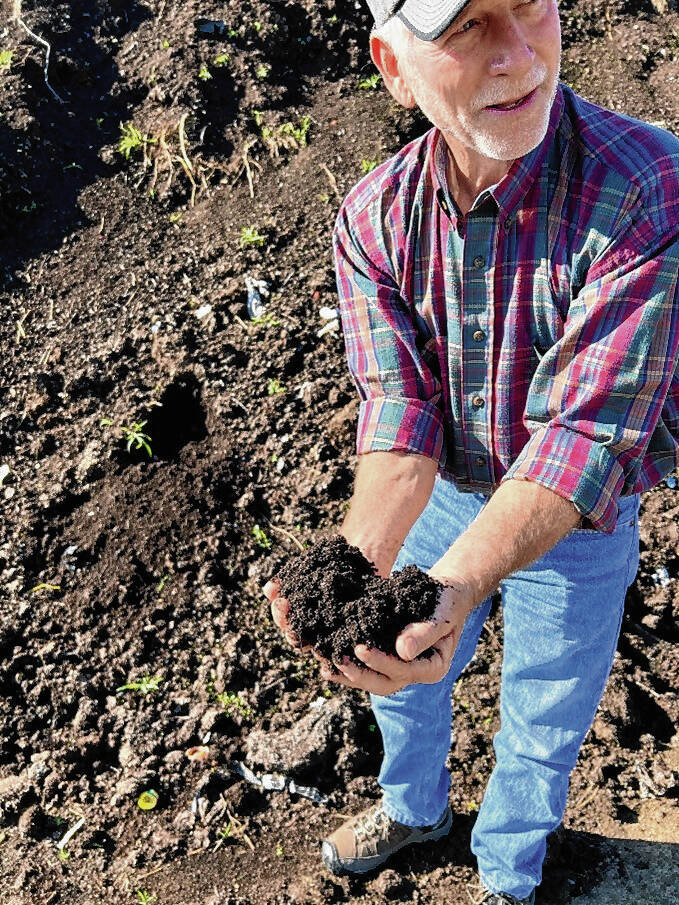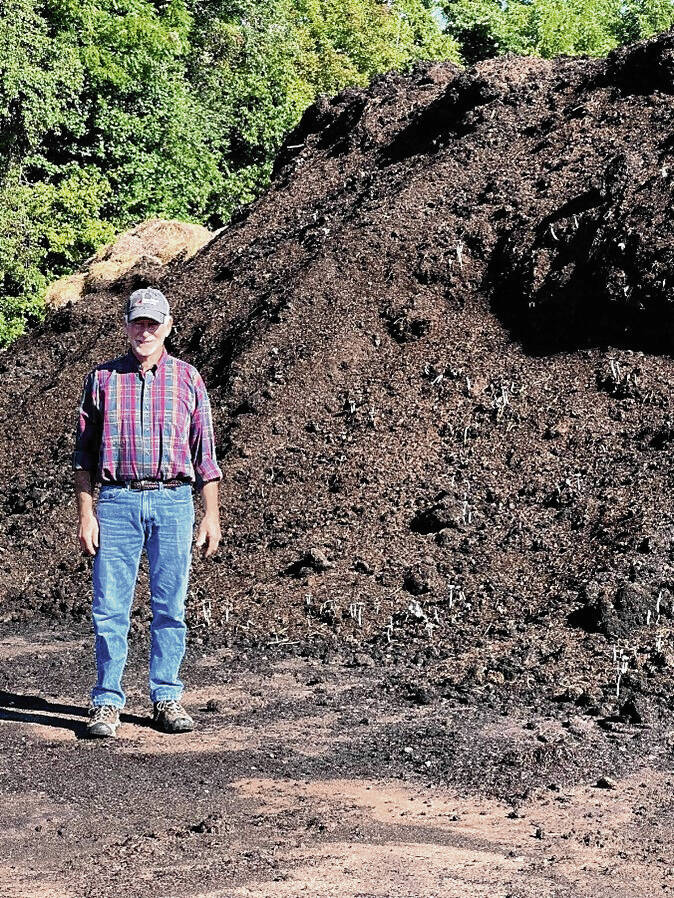
Charlie Fox holds some compost from a pile at his rural Seymour farm. Fox recently was named the 2022 Jackson County Conservation Farmer of the Year.

Charlie Fox has used composting to add organic matter and reduce his dependency on commercial fertilizers on farm. Fox recently was named the 2022 Jackson County Conservation Farmer of the Year.
Charlie Fox, who recently was named the 2022 Jackson County Conservation Farmer of the Year, and his wife, Nancy, are blessed to own farmland that has been in the Fox family for more than 150 years.
The award is presently annually by the Jackson County Soil and Water Conservation District, and the winner is picked by the district’s supervisors.
Charlie’s great-grandfather, John Fox, returned from the Civil War and raised a family of seven children on part of the farm. Windblown sand and glacial deposits are very common with as many as nine different soil types in one field in the Reddington area where the Foxes farm.
Farming practices have evolved over the years.
In the 1960s, moldboard plowing was the method of choice. In the 1970s, chisel plowing was used. Then in the 1980s, minimal tillage practices began.
Minimal tillage started when Charlie purchased a no-till planter in 1988, and from 1988 to 1993, corn was planted into green wheat cover crop. A three-year crop rotation and planting highly erodible fields with alfalfa and orchard grass for seven to eight years helped stabilize the sand hills.
Technology was added in the early 1990s. Nutrients were applied by GPS, and Fox purchased a no-till drill to plant soybeans, wheat and cover crops.
In 2006, a chain trencher tile machine was bought to repair/replace old clay tile runs, which were causing sinkholes, washes and swampy areas. Soil testing each soil type began in 2008-2009. Soil nutrients were balanced on a percentage basis. In 2009, gypsum was introduced to mellow difficult no-till soil and to reduce erosion.
Charlie became involved with the Natural Resource Conservation Service and enrolled 900 acres in the Conservation Stewardship Program.
Cereal rye was used for a cover crop after corn on sand ground and multiple species of cover crops on heavier soils. In 2010, Fox started raising his own VNS cereal rye for cover crops and proceeded to clean, test and sell extra bushels to other farmers.
Fox has spent a lifetime pursuing opportunities to address soil variations to farm the ground for what it’s best suited for.
No-till was a major change for the good, he said. Cover crops, although challenging over the years, have been very helpful. Still low on organic matter, he started the composting process and learning curve.
Composting has enabled Fox to add organic matter and reduce the dependency on some commercial fertilizers, which are high in salts. He discovered the salts on his coarse, sandy ground were restricting root growth at subsurface levels, causing wilting and stunting, especially in dry spells and during reproduction stages of the crops.
No-till has been a huge money saver in time, equipment investment and fuel, he said.
Fox purchased a turbo-seeder in 2021 to aid in the planting of cover crops and small grains. Cover crops have in turn enhanced no-till practices by adding more organic matter and less soil erosion.
There are 1,150 acres of cropland on which he rotates corn, beans, wheat and cereal rye.
For 34 years, Fox has no-tilled his cropland acres and has used cover crops over 900 acres. For 12 years, he has installed field borders. He also sows alfalfa, orchard grass hay and grass hay. Twenty-five cows and 36 calves and feeders graze on 41 acres of pasture, and he has 282 acres of woodland.
In 2014, Fox started gathering composting materials, and in 2015, he started working with the Indiana Department of Environmental Management to measure the different materials and mixes in piles to determine the best practices to make compost for agriculture use. The different materials include city leaves, wood grindings, horse manure in sawdust and straw bedding, cattle manure in straw bedding, chicken manure and city biosolids.
Fox has installed and used several conservation practices in his farming operation because he believes they will maximize long-term soil health of his property for future generations. Applying the conservation practices will protect the environment, continually enhance soil fertility and bio-life for maximum crop production and protect the ground from erosion by using no-till and cover crop strategies.
After using the conservation practices, Fox said he has observed through soil testing the increase in organic matter content, averaged yields have increased due to better stewardship of sand hills, crops have shown more tolerance during lengthy dry spells, earthworm population has increased and drainage has improved to allow better biological activity in low areas.
Charlie has spent his whole career as a farmer learning and still does not have all of the answers but said he feels conservation practices have greatly enhanced their farm.
He and Nancy are very excited to know they have improved the soil and will be passing the farm along in better condition than when they started.
“We need to be very diligent in teaching the next generation to be good stewards,” Charlie said. “Good stewards believe in sustainability, embrace innovation and change and committed to selfless service.”
Fox said he and his wife believe God has given them the responsibility to act as stewards of his creation to care for, manage, oversee and protect all that he owns. “The earth is the Lord’s and all that is in it, the world and those who live in it.” Psalms 24:1. “Moreover, it is required of stewards that they be found trustworthy.” 1 Corinthians 4:2.
